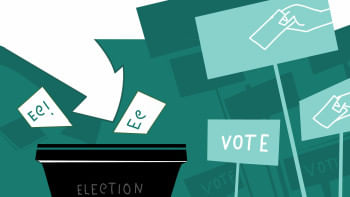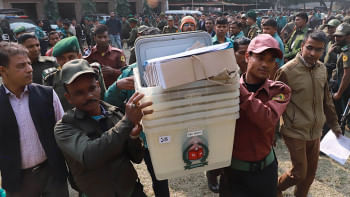Don't be fooled by the RPO amendment

Chief Election Commissioner (CEC) Kazi Habibul Awal's comment defending the recent amendment of the Representation of the People Order (RPO) seems to be well-synchronised with the government's narrative. Brushing aside experts' criticisms for losing some of its crucial regulatory powers, the CEC said, "No authority of the Election Commission has been abolished with the amendment; it has been consolidated."
If the CEC's assertion that no authority has been curtailed is true, then one may ask: what warranted them to seek legal authority for cancelling elections of an entire constituency in the event of widespread violation of electoral rules? Experts have merely pointed out that the authority that the Election Commission sought was already there, and they even applied that power in suspending voting of the entire constituency of Gaibandha-5 during its by-polls last year. Following the new amendment, the EC will no longer be able to cancel or suspend voting of an entire constituency, let alone the election process, prior to the polling day, except in the event of a candidate's demise.
CEC Awal now says, "…the government has not revised the RPO. They did as per our proposal. The government has agreed to the amendments sought by the Election Commission to make the latter's position more consolidated and strengthened. It has increased our power." Here is a reminder about what Law Minister Anisul Huq told lawmakers in concluding the parliamentary debate before passing the bill. He, too, said the RPO amendment would not curtail the EC's power, but termed the EC's power to suspend polling in the entirety of a constituency "undemocratic."
The law minister's argument was based on the assumption that suspending voting in an entire constituency if violence or irregularities took place in only a few polling centres amounted to taking away the peoples' right to vote. Unfortunately, past experience tells us that due to the nature of our political rivalry, rampant irregularities on election days have become a norm in our country. The CEC's refusal to recognise this change as curtailment of the EC's power is deeply problematic.
There have been some woeful examples of the current EC's inability, such as their failure in taking action against a member of parliament belonging to the ruling party for defying their order during the Cumilla city polls last year. When there were empowering rules, the EC failed to enforce them appropriately, but now wilful relinquishment of some authority makes us wonder how they can claim they are prepared to ensure a free and fair parliamentary election.
His explanation about replacing the word "election" with "polling" as a clerical correction is also quite strange. To lighten the significance of this alteration, he says, "Clerical correction is just correction," which is legally untenable. In the RPO, there's a legal definition, though scanty, of election – Article 2 (vii) – but "polling" remains undefined. Generally, it is accepted that polling means the activity on the day of the vote, but election denotes the entire process. The RPO defines the election as "election to a seat of a member held under this Order."
In the world of legal jargons, too, polling doesn't equate to election. Oxford Constitutional Law says, "An election is a process by which citizens are called to choose representatives to adopt important decisions in their interest, according to the principle of political representation, and to decide on specific matters." In contrast, "poll" or "polling" refers to either 1) the process of voting, 2) the place where the voting is conducted, or 3) the result of the voting, according to the Legal Information Institute of Cornell School of Law.
I have argued before that setting the rules of the game should follow settling the ongoing political dispute between the two main contending parties, as experiences between 1991 and 2009 show that such accords reduce violence and irregularities. Political consensus provided the basis that helped with the enforcement of code of conduct and limited, to some extent, vote-buying and influence of black money. But the EC's rush in revising the RPO meant allowing the ruling party to impose their wish in the codification process. And the result is not only the weakening of the EC's authority, but relaxing of rules such as extending extra facilities to loan defaulters.
The incumbent EC often claims that they have successfully conducted several elections during their tenure of over one year. But it belies the fact that most of those elections were intra-party contests of the ruling Awami League, as their main challenger, the BNP, stayed away from the elections, expressing no-confidence in the EC. There have been some woeful examples of the current EC's inability, such as their failure in taking action against a member of parliament belonging to the ruling party for defying their order during the Cumilla city polls last year. When there were empowering rules, the EC failed to enforce them appropriately, but now wilful relinquishment of some authority makes us wonder how they can claim they are prepared to ensure a free and fair parliamentary election.
There's no doubt that the 15th amendment of the constitution and the ruling party's insistence on constitutionalism have left the EC effectively helpless. The arbitrary enactment of the 15th amendment meant not only the abolition of the caretaker government system for holding general elections, it also kept alive the parliament, leaving the EC powerless against privileges claimed by MPs. In a sense, the CEC was right when he said the EC did not dig their own grave, because it's the government which is in charge of the graveyard. But the EC certainly has taken the hope of a free, fair and democratic election one step closer to the grave.
Kamal Ahmed is an independent journalist. His Twitter handle is @ahmedka1

 For all latest news, follow The Daily Star's Google News channel.
For all latest news, follow The Daily Star's Google News channel. 










Comments